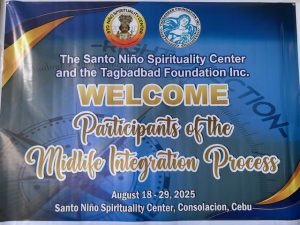Today is the 22nd Sunday in Ordinary Time, and we are invited by God to listen attentively to His words in the Scriptures. Listening with full attention requires humility and openness to God’s whispers.
The Midlife Integration Process ended yesterday. It was an ongoing program for priests aged 34-65. It was an enriching experience with simple activities focused on openness, adoration of the Blessed Sacrament, and spending time with Jesus in the Eucharist. The program helped us connect with one another by recognizing the many changes that have occurred in our lives. We humbly acknowledged our shared experiences. Participants formed a circle of support, helping one another to reflect both inwardly and outwardly. This sense of acceptance fostered dignity, kindness, and understanding, and deepened our focus on love—for God, for ourselves, for others, and for our ministry.
The process was physically, spiritually, cognitively, and ministerially enriching. I personally believe it was more impactful than any preached retreat, as it touched the heart, body, and spirit of every priest. It was a challenging yet transformative process, requiring us to let go of shadows and place them under the loving arms of God. The integration of cognitive, emotional, and psycho-spiritual changes provided an opportunity for a more balanced, productive, and fruitful priestly ministry. This journey calls for humility and the choice to live a clean, healthy lifestyle that leads to God’s favor.
Today’s readings focus on the call to humility, which is a fundamental Christian virtue. St. Augustine says, “The greatest virtue is first, humility; second, humility; and third, humility.” Humility is necessary for living as children of God. Indeed, we are called to imitate the humility of Jesus Christ, our Lord and Savior.
In the first reading, from the Book of Sirach, we are reminded that in everything we do, we should act humbly, and we will be loved. If something is beyond our ability, we should seek wisdom and avoid complicating matters that might lead us into sin. The secret to happiness in life is humble service.
The second reading, from the Letter to the Hebrews, gives us a clearer vision of our ultimate destiny: the heavenly Jerusalem, where angels and the righteous gather together. But the path to that destination is through Jesus, our mediator, who leads us to Mount Zion and the city of the living God. The heavenly Jerusalem was established through the redemptive blood of our Savior, and it is in Him that we place our trust.
In the Gospel according to Luke, Jesus teaches His disciples about humility. He advises that, when invited to a banquet, we should take the lowest place and wait for the host to invite us to a more honored seat. Jesus promises that those who humble themselves will be exalted and rewarded at the resurrection.
In Filipino culture, meals and the preparation of food hold great importance in our society, just as they did in the time of Jesus. A meal is a time for sharing nourishment, ideas, and the dynamics of human relationships.
In today’s Gospel, Jesus advises hosts not to invite people who are likely to repay them, but rather to invite those who cannot repay: the poor, the crippled, the lame, and the blind. This reflects the “reversal style” often found in Luke’s writings, where the kingdom of God is portrayed as favoring the poor and those who cannot repay. True blessings, according to Jesus, are found in serving these individuals.
This parable provides wise advice to both guests and hosts about finding true happiness at the heavenly banquet. Jesus warns guests to wait before taking their places at the table, lest they be asked to move if someone more important arrives. This advice is not merely about dinner etiquette; it points to how we should seek our true place in the kingdom of God. Jesus advises, “Behave humbly, and you will find favor with the Lord.”
Humility is a defining characteristic of the life and ministry of Jesus Christ, our Lord. While pride may be a natural human tendency, it is a sickness that can be cured by imitating Jesus’ humility. We must clothe ourselves in humility, which serves as our passport to the eternal city, Jerusalem.
Finally, Jesus Christ exhorts us: “Everyone who exalts himself will be humbled, and the one who humbles himself will be exalted.” In life, we can learn much from the Blessed Virgin Mary, St. Joseph, St. Augustine, and many other saints who humbled themselves and attained eternal glory with God. There is nothing to lose by being humble.
Let us enter into a new style of prayer as we mature, moving from discursive prayer to affective and contemplative prayer. This shift allows us to completely rely on and abandon ourselves to God. Humility is the foundation of our prayer. Only a humble heart can prostrate before God in prayer. Humble people are always ready to seek guidance from God and from others. We need to listen to the inner voice and implore the Lord to give us His humble heart.
Midlife is both a period and a process of transition. When one journey ends, another begins. With profound humility, we must become aware of and accept our interior experiences of peace and restlessness, joy and pain, light and darkness. True greatness comes from recognizing our limits and relying on God.
May God continue to teach us the path of humility.
Happy blessed Sunday!
Fr. Arlon, OSA
El Dictado del Corazón
Vigésimo-Segundo Domingo del Tiempo Ordinario – Ciclo C
- Eclesiástico (Sirácide) 3, 17-18. 20. 28-29
- Salmo 67, 4-7. 10-11
- Hebreos 12, 18-19. 22-24
- Lucas 14, 1. 7-14
Hoy celebramos el Vigésimo-Segundo Domingo del Tiempo Ordinario, y Dios nos invita a escuchar atentamente Su Palabra en las Escrituras. Escuchar con plena atención requiere humildad y apertura a los susurros de Dios.
Ayer concluyó el Proceso de Integración de la Mediana Edad, un programa continuo para sacerdotes de entre 34 y 65 años. Fue una experiencia enriquecedora con actividades sencillas centradas en la apertura, la adoración al Santísimo Sacramento y el tiempo de intimidad con Jesús en la Eucaristía. El programa nos ayudó a conectar unos con otros al reconocer los muchos cambios que han ocurrido en nuestras vidas. Humildemente reconocimos nuestras experiencias compartidas. Los participantes formaron un círculo de apoyo, ayudándose mutuamente a reflexionar tanto hacia el interior como hacia el exterior. Este sentido de aceptación fomentó la dignidad, la bondad, la comprensión, y profundizó nuestro enfoque en el amor a Dios, a nosotros mismos, a los demás y a nuestro ministerio.
El proceso fue enriquecedor física, espiritual, cognitiva y ministerialmente. Personalmente creo que fue más impactante que cualquier retiro predicado, ya que tocó el corazón, el cuerpo y el espíritu de cada sacerdote. Fue un proceso desafiante pero transformador, que nos exigió soltar sombras y ponerlas bajo los amorosos brazos de Dios. La integración de los cambios cognitivos, emocionales y psicoespirituales ofreció una oportunidad para un ministerio sacerdotal más equilibrado, productivo y fecundo. Este camino exige humildad y la elección de vivir un estilo de vida limpio y saludable, que nos lleva a una profunda comunión con Dios, y a sí podemos servir con mas fervor al pueblo de Dios.
Las lecturas de hoy se enfocan en el llamado a la humildad, una virtud cristiana fundamental. San Agustín decía: “La mayor virtud es, primero, la humildad; segundo, la humildad; y tercero, la humildad.” La humildad es necesaria para vivir como hijos de Dios. De hecho, estamos llamados a imitar la humildad de Jesucristo, nuestro Señor y Salvador.
En la primera lectura, del libro del Eclesiástico (Sirácide), se nos recuerda que en todo lo que hagamos, debemos actuar con humildad, y seremos amados. Si algo está más allá de nuestras capacidades, debemos buscar sabiduría y evitar complicarnos con cosas que nos puedan llevar al pecado. El secreto de la felicidad en la vida es el servicio humilde.
En la segunda lectura, de la carta a los Hebreos, se nos da una visión más clara de nuestro destino final: la Jerusalén celestial, donde se reúnen los ángeles y los justos. Pero el camino hacia ese destino es a través de Jesús, nuestro mediador, quien nos conduce al Monte Sión y a la ciudad del Dios vivo. La Jerusalén celestial fue establecida por la sangre redentora de nuestro Salvador, y es en Él en quien depositamos nuestra confianza.
En el Evangelio según san Lucas, Jesús enseña a sus discípulos sobre la humildad. Aconseja que, cuando seamos invitados a un banquete, tomemos el lugar más humilde y esperemos a que el anfitrión nos invite a un lugar más honroso. Jesús promete que los que se humillan serán exaltados y recompensados en la resurrección.
En la cultura filipina, las comidas y la preparación de los alimentos tienen gran importancia en nuestra sociedad, al igual que en tiempos de Jesús. Una comida es un momento para compartir alimento, ideas y las dinámicas de las relaciones humanas.
En el Evangelio de hoy, Jesús aconseja a los anfitriones que no inviten a quienes les puedan devolver el favor, sino que inviten a quienes no pueden hacerlo: los pobres, los lisiados, los cojos y los ciegos. Esto refleja el estilo de “inversión de valores” frecuente en los escritos de Lucas, donde el Reino de Dios se presenta como favorable a los pobres y a los que no tienen con qué pagar. Las verdaderas bendiciones, según Jesús, se encuentran en servir a estos hermanos.
Esta parábola ofrece sabios consejos tanto a los invitados como a los anfitriones sobre cómo encontrar la verdadera felicidad en el banquete celestial. Jesús advierte a los invitados que esperen antes de tomar su lugar en la mesa, no sea que se les pida cederlo si llega alguien más importante. Este consejo no se refiere únicamente a modales en la mesa, sino que señala cómo debemos buscar nuestro verdadero lugar en el Reino de Dios. Jesús nos dice: “Compórtate con humildad y hallarás favor ante el Señor.”
La humildad es una característica definitoria de la vida y del ministerio de Jesucristo, nuestro Señor. Aunque el orgullo puede ser una tendencia natural humana, es una enfermedad que se puede curar imitando la humildad de Jesús. Debemos vestirnos con humildad, que es nuestro pasaporte a la ciudad eterna: Jerusalén.
Finalmente, Jesucristo nos exhorta: “El que se enaltece será humillado, y el que se humilla será enaltecido.” En la vida, podemos aprender mucho de la Santísima Virgen María, de San José, de San Agustín y de muchos otros santos que se humillaron y alcanzaron la gloria eterna con Dios. No hay nada que perder al ser humildes.
Entremos en un nuevo estilo de oración conforme maduramos, pasando de la oración discursiva a la oración afectiva y contemplativa. Este cambio nos permite confiar y abandonarnos totalmente a Dios. La humildad es el fundamento de nuestra oración. Solo un corazón humilde puede postrarse ante Dios en oración. Las personas humildes están siempre dispuestas a buscar orientación de Dios y de los demás. Necesitamos escuchar la voz interior e implorar al Señor que nos conceda Su corazón humilde.
La mediana edad es tanto un período como un proceso de transición. Cuando una etapa termina, otra comienza. Con profunda humildad, debemos tomar conciencia y aceptar nuestras experiencias interiores de paz e inquietud, alegría y dolor, luz y oscuridad. La verdadera grandeza proviene de reconocer nuestros límites y de confiar en Dios.
Que Dios continúe enseñándonos el camino de la humildad.
¡Feliz y bendecido domingo!
P. Arlon, OSA









